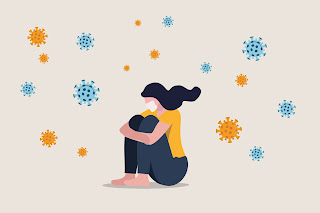Coronavirus spread speedily across the world.
Coronavirus disease (COVID-19) was firstly identified in December-2019 in China City Wuhan. And its spread firstly in China then, afterwards throughout the world.
Psychological Effects of COVID-19 Pandemic:
The coronavirus pandemic is an epidemiological and psychological disaster.
The viciousness of living in isolation, changes in our daily lives, job loss, financial hardship and grief over the death of love ones have the potential to affect the mental health and well-being of man.
It’s a very life-threatening to search for connection and social support with others.
Social distancing can make people feel lonely and isolated and can raise stress and anxiety. However, these actions are essential to decrease the spread of COVID-19.
Coping with stress in a healthy the way will make you, the people you care about, and your community stronger.
Many psychological problems and significant consequences in terms of mental health including;
- Anxiety
- Stress
- Depression
- Frustration
- Uncertainty
Stress during this pandemic cause;
- Fear and worry about health and the health of loved ones, financial situation or job, or loss of support services rely on.
- Changes in sleep or eating patterns.
- Difficulty sleeping or concentrating.
- Worsening of chronic health problems.
- Worsening of mental health condition.
Signs of Anxiety:
- Stubborn worry or feeling overwhelmed by emotions.
- Difficulty concentrating, sleep problems and generally feeling on edge
- Restlessness and irritability.
- Deficiency of interest and pleasure in daily activities.
- Frequent thoughts of death or suicide.
- Deficiency of energy or an inability to concentrate.
- Insomnia or unnecessary sleeping.
- Significant weight loss or gain.
- Feelings of worthlessness or extreme guilt.
- Changes in personality like sadness, withdrawal, irritability or anxiety.
- Erratic behaviour, harming self or others.
- A conversation about dying or harming oneself.
- Changes in behaviour, sleep patterns and eating habits.
- Recent loss through death, divorce, separation, even loss of interest in friends, hobbies and activities previously enjoyed.
- No hope for the future, believing things will never get better or nothing will change.
- Low self-esteem including feelings of worthlessness, guilt or self-hatred.














No comments:
Post a Comment
Please don't enter any spam link in the comment box.